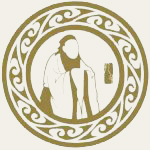At fifty, Confucius knew the mandate of heaven. At this vital moment in his life, Confucius decided to visit Laozi (老子) for the third time, hoping to gain more insight from him.
Even if their views on Ren (仁) and Yi (义) had diverged in their second meeting, Confucius still showed great respect for Laozi. He believed these differences did not prevent him from gaining more knowledge from Lao Tzu, which could further enrich his wisdom.
Therefore, when Confucius was lost in his explorations again, he did not hesitate to seek Laozi’s guidance and initiate their third meeting.
The Third Meeting between Confucius with Lao Zi
This meeting between Confucius and Laozi probably occurred when Confucius was fifty-one.
At this time, Confucius was famous throughout the world. When he heard that Laozi had returned to his hermitage in Peidi (沛地), the state of Song (宋国), he visited Laozi with his disciples.
During this meeting, they mainly discussed what the Tao (道, the Way of the Universe) was.
When Laozi saw Confucius, he asked, “We haven’t seen each other for a decade, and I’ve heard that you’ve become a sage of the north. What are your purposes for this visit?”
Confucius humbly said, “Although I have always thought hard and studied diligently and traveled for more than ten years without gaining, I have not yet stepped on the threshold of the Tao because I have little talent and less learning. That is why I have come here to ask for your advice.”
Lao Tzu said, “If you want to see the Tao as it is, you must emphasize the origin of all objects, whether within heaven and earth or outside the universe. People and other creatures or objects between heaven and earth, the sun, the moon, mountains, and rivers are all different in form and character. What they have in common is that they follow the laws of nature.”
Confucius asked, “What pleasure is in seeing the sameness of all things?”
Lao Tzu said, “If you observe the commonities, all things are essentially the same. All things and I are the same, and so are right and wrong. Thus, it is possible to consider life and death as day and night, and misfortune and happiness, good and evil, as equal, without any distinction between status, honor, or disgrace. Then, if we are tranquil within ourselves, unmoved by external things, and treat people according to our own heart and without restraint, where would we not be happy?”
When Confucius heard this, he could not help exclaiming, “This is so vast and boundless! I have lived for fifty-one years and only know little about Ren and Yi. How could I have known that the universe is so vast and limitless? It’s so pleasant, go ahead! Go on!”
Believing that Confucius learned the essence of Tao, Lao Zi calmly said, “When the sages deal with different matters, they do not go against the grain. When things change, the sages do not stick to their views but react and act accordingly. Hence, those who can adapt to nature are moral people, and those who can adapt to the situation truly understand the Tao.”
Lao Tzu added: “He who understands the Tao observes the nature of things based on the Tao. Life and death, right and wrong, nobility and inferiority, and honor and dishonor involve human values, and they are all in a state of instantaneous change. But in essence, they are all the same with no difference. Then, those who know this truth can adapt to their changes without worrying. They can take it calmly with the alternation of day and night, whether a landslide or lightning.”
When Confucius heard this, he said, “At thirty, I stood firm. At forty, I had no doubts. And now that I am fifty-one, I know what nature is.“
After the talk, Confucius bid farewell to Laozi.
Summary
In this conversation, Lao Tzu told Confucius that the pursuit of the Tao must come from the actual needs of the heart rather than being driven by fame and gain.
He believed that the Tao was the master of all things and that the only way to the Tao was to follow it.
This understanding of the Tao was an essential inspiration for Confucius in his quest for political reform. He began to consider how to change his way of thinking to free himself from the constraints of merit and fame and explore the Tao from within.

Leave a Reply Cancel reply